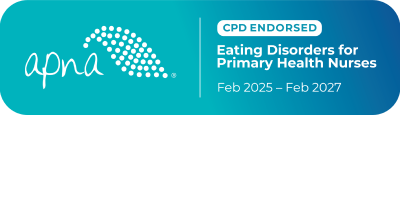Eating Disorders for Primary Health Nurses
Overview
Primary Health Nurses work across a range of health and community-based settings such as general practice, community health centres and schools. This places them in a position to detect and support people with eating disorders which often go undetected. Nurses with awareness and expertise in eating disorders can acknowledge and address these serious illnesses to provide an early intervention and better outcomes for people.
This course will provide Primary Health Nurses with knowledge and tools in prevention, identification, screening, and management of patients with eating disorders. Nurses will develop strategies and confidence in talking to and supporting people with eating disorders, awareness of at risk groups and the stigma that is associated with these illnesses. They will also learn about the relevant guidelines available that inform the evidenced based treatment of eating disorders in Australia.
Any registered nurse working in the Australian primary health setting will benefit from this course; interested others may also attend.
What you'll learn
By the end of this course, you will:
- Describe the different eating disorder diagnoses and develop an increased knowledge of prevalence rates, at risk groups and the stigma that surrounds this illness group affecting patient outcomes.
- Explain the importance of early detection, screening and early intervention in the treatment of eating disorders
- Develop strategies and confidence in supporting someone with an eating disorder, including talking about eating disorder behaviours and weighing accurately and sensitively
- Identify the medical and psychiatric risks of eating disorders and demonstrate knowledge in the management of these and the relevant guidelines available.
Charles Perkins Centre

Aims
We aim to leave you feeling empowered to detect at an early stage patients who present with other issues but whose eating disorders are often unacknowledged. You will be equipped to screen the patient and to safely and effectively support them using evidence-based tools.
The focus of the course
- Early Detection and Screening: Learning how to identify the signs and symptoms of eating disorders early, using evidence-based screening tools.
- Understanding Eating Disorder Diagnoses: Gaining in-depth knowledge of various eating disorders, including their prevalence and the impact of societal stigma.
- Developing Support Strategies: Creating practical, sensitive strategies for supporting individuals with eating disorders, including effective communication and accurate weight assessment techniques.
- Risk Assessment and Management: Identifying and managing the medical and psychiatric risks associated with eating disorders, with a focus on applying current best practices and guidelines.
- Interdisciplinary Collaboration: Understanding the role of the multidisciplinary team in treating eating disorders and learning how to coordinate care effectively
Content
Module 1
What are eating disorders?
- Introduction
- Prevalence
- Common misperceptions
- Stigma
Module 2
- Identification
- Engagement and symptomatology (Detection and SCOFF)
- Therapeutic engagement
- Symptoms and behaviours
- Weighing
Module 3
Risks and Management of Eating Disorders, involving:
- Medical and psychological monitoring
- Identifying risk and indicators for hospitalisation
- Relapse and triggers
- Working with GPs
- Evidence-based treatment
Conclusion
Quiz, assessment, references, resources
APNA endorsement
This activity has been endorsed by APNA according to approved quality standards criteria.

The course is suitable for registered nurses in Australia. Others may attend if interested.
Self-paced online learning consisting of approximately 15 hours.
Once enrolled, the course is open to students for 12 weeks. It is advised that students complete it in the first 5 weeks, and allow time for assignment submission and marking before week 9.
It is assumed you have completed Registered nurse or Enrolled nurse or have equivalent knowledge.
Materials
All course materials are provided electronically through our Learning Management System (LMS) called Canvas 2. After enrolment, you will receive an email with instructions on how to access the LMS. If you have been enrolled in Canvas 2 before, log in using the email address you enrolled with.
Software
We recommend using a desktop computer or laptop. Ensure compatibility by accessing Canvas on the latest versions of Chrome, Firefox, Edge, or Safari.
Viewing on a mobile device? If you're using the Canvas app, please download the latest version and adjust your app settings to access all images and videos on the site.
Recommended reading:
Marks, P. and Mulvey, B., 2024. Eating disorders. In: K. Foster, P. Marks, A.J. O'Brien and T. Raeburn, eds. Mental health in nursing: Theory and practice in clinical settings. 6th ed. Elsevier, pp. 246-272.
Screen and assess a case (provided) for an eating disorder and develop a management plan. Include the relevant screening tools and guidelines used, risks identified and evidence-based treatment options and that inform your plan. Describe how you would talk to someone about their illness behaviour, provide examples.
All courses must be paid in advance of commencing your course. We accept the following payment methods:
- Mastercard
- Visa
- American Express (only available for enrolments made through the Sydney Short Courses website)
- Electronic Funds Transfer (for company invoices only)
- Journal Transfer (for University of Sydney Staff only)
Please see our Payment Options for further information.
I have enrolled in a Sydney Short Courses course, what happens now?
Once your enrolment has been processed, you will receive the following emails:
- Enrolment confirmation: you will receive this immediately after your enrolment has been processed.
- Tax invoice: the payer of your enrolment will receive this immediately after your enrolment has been processed.
For some courses, you may also recieve the following:
- Course reminders: you will receive emails from Sydney Short Courses in the lead up to the course starting. These include information about the course and, if required, the schedule for online or face-to-face sessions.
- Course materials: if you are enrolled in a course that provides reading or other downloadable materials, you will get access to these materials prior to the class commencing.
- Online session links: you will receive reminder emails the day before and the day of each live session containing the meeting link and meeting ID.


